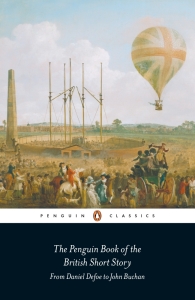 For the last month I’ve been discussing two stories a week from Volume One of The Penguin Book of The British Short Story edited by Phillip Hensher, (phew, that’s a mouthful, isn’t it) with one of my creative-reading groups. It’s been a revelation, and I speak as the owner of a long shelf of some excellent short story anthologies.
For the last month I’ve been discussing two stories a week from Volume One of The Penguin Book of The British Short Story edited by Phillip Hensher, (phew, that’s a mouthful, isn’t it) with one of my creative-reading groups. It’s been a revelation, and I speak as the owner of a long shelf of some excellent short story anthologies.
This book takes such an historic view of the form, that we’ve only just reached the point where the term ‘short story’ is beginning to be used. The anthology opens with Daniel Defoe’s pamphlet, A True Relation of the Apparition of Mrs Veal, written and published in 1706. Yet Hensher says:
The term ‘short story’ only occurs towards the end of the nineteenth century, although it is difficult to be quite sure when: the OED‘s first citations, which are from 1877 and (Trollope’s autobiography) 1882, seem to use the phrase as an established usage. To a surprising degree, authors of the time do seem to regard it as a much newer form than the novel.
His twenty-six page discussion on the reasoning behind this anthology, is one of the texts that I would recommend the collection for. It covers a lot of ground, and for the writer or the reader, provides some interesting ideas about, for instance, how short stories can work:
One of the very striking aspects of the British short story, as revealed by the experience of reading through weekly news-orientated journals, was its capacity to react immediately to events of the most public order. Novels seem to take a few years to ruminate over the news, to develop the impact of social changes or dramatic public events on lives.
I’m a late convert to introductions, and like any transformed personality, I’ll grab any opportunity to share the results of my epiphany.
So, let me start by suggesting something radical: despite its title, you don’t have to read an ‘introduction’ first. For novels, I generally leave them until later, and then find myself dipping back through the pages to track down the intriguing references and compare the writer’s conclusions with my impressions.
And that brings me to my next point. We don’t have to agree with the introduction. It’s all too easy to feel that because someone’s ideas are printed in the front of the book, they’ve got the definitive view on what the main text says, or does. Not so. In the same way that two people looking out of the same window (or three, four or more, come to that) will observe the view in distinctively individual ways, no two readers will understand a piece of writing in precisely the same light.
Our tastes and histories colour the way we understand stories. This becomes clearer to me with every creative-reading session that I share. Even when we’re discussing a text that I’ve covered with another group, or groups, I discover new responses to the readings. That’s exciting: it’s challenging. I like the idea that stories speak to a wide audience on a variety of levels, and that they don’t have to be short-lived, disposable artefacts.
Some, though, are. That’s fine, I read and enjoy those too. What an introduction can do, is provide me with a little guidance, if I want to look deeper. If someone else is giving hints about hidden depths, I’ll go back to stories that I might otherwise have passed by just the once, and opening one of those up is my idea of a treasure hunt.
From all of which thoughts, I’m lead to the interesting conclusion that introductions to story anthologies are the opposite of spoilers.

Tom Gauld Cartoon.

Great and timely post! I picked the Penguin Book of the British Short Story off the bookshop shelf just today, but put it back again :(. I love introductions also, and always read them when I’ve finished the story. I must read more anthologies!
LikeLiked by 1 person
Maybe it will still be there when you go back, and it’s certainly an unusual selection.
LikeLiked by 1 person
Since any good short story deserves and repays re-reading, the concept of reading the introduction after the first reading is a good one. Beforehand it does not work for me. I am sure there is a proper word – is it epilogue or conclusion? I await further words of wisdom, Cath😃
LikeLiked by 1 person
Now that’s a tricky one, isn’t it? I suppose, in this case, if you think of the ‘intro’ as pin-pointing a moment of changing view, it could be the start of a new chapter (in your reading)…but it’s too long to be considered an epigraph…I wonder if you’ve invented something.
LikeLike
Richard Hughes’ intro to Wm. Faulkner’s difficult novel ‘The Sound and the Fury’ encouraged me to keep going when I felt like flinging it through the window. Thankful for that …
LikeLiked by 1 person
I think that’s the Faulkner I’ve got on my to-be-read shelf. thanks for the tip, I’ll check it’s one with an intro before I lay in to that one.
LikeLiked by 1 person
I read the book and, unusually, started reading it again – just as the intro said I might!
LikeLiked by 1 person
Tempting…that’s just the sort of book I love.
LikeLiked by 1 person
Worth the struggle, I’d say …
LikeLiked by 1 person